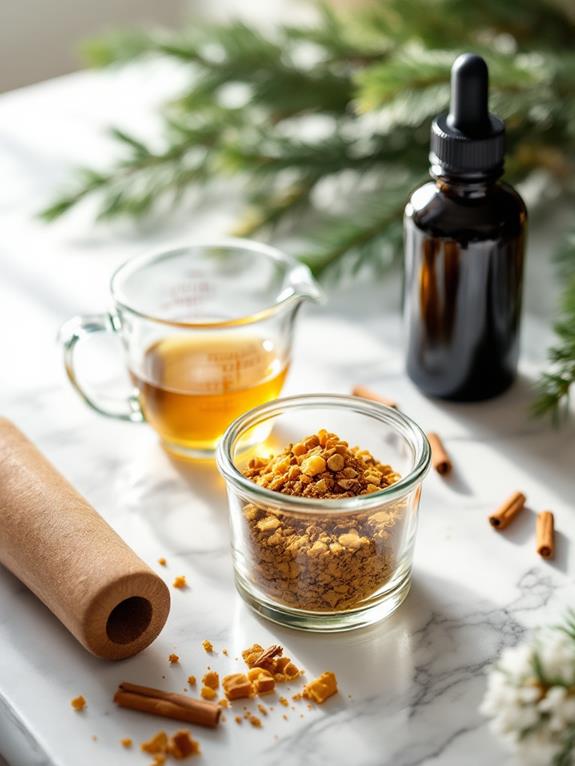
Unlocking Nature’s Pharmacy: Crafting Your Own Resin Tinctures
Have you ever wondered about harnessing the potent healing power of plants in their most concentrated form? Enter resin tinctures, a time-honored method of extracting the medicinal essence from nature’s treasures. these liquid extracts, crafted by infusing resins in alcohol, offer a potent and versatile way to experience the benefits of herbs like frankincense, myrrh, and copal.
Beyond their historical importance, resin tinctures are experiencing a resurgence in popularity as people seek natural alternatives for wellness and self-care. Thay’re incredibly versatile, easily incorporated into daily routines through drops under the tongue, added to teas or smoothies, or even diluted in carrier oils for topical application.
A Journey Through Time: the Ancient Art of Resin Tinctures
The practice of creating resin tinctures dates back centuries, with evidence suggesting its use in ancient Egypt, Greece, and Rome.These civilizations recognized the potent healing properties of resins like frankincense and myrrh, utilizing them for everything from treating wounds to promoting spiritual well-being.
Today, we continue this tradition by crafting our own resin tinctures, allowing us to connect with nature’s wisdom and experience its benefits firsthand.
Crafting Your Own resin Tincture: A Step-by-Step Guide
Creating a resin tincture is a surprisingly simple process that requires minimal equipment and ingredients. Here’s a detailed guide to help you embark on your tincture-making journey:
1. Gather Your Ingredients:
Resin: Choose high-quality resins like frankincense, myrrh, copal, or benzoin.
Alcohol: Opt for a high-proof alcohol (at least 40% ABV) such as vodka or grain alcohol. This acts as the solvent to extract the resin’s beneficial compounds.
2. Grind the resin:
Using a mortar and pestle, grind the resin into a fine powder. This increases the surface area, allowing for more efficient extraction.
3.Seal and Store:
Place the ground resin in a clean glass jar with a tight-fitting lid. Pour enough alcohol over the resin to completely submerge it. Seal the jar tightly and store it in a cool,dark place for 4-6 weeks,shaking gently every few days.
4. Strain the Mixture:
After the allotted time, strain the tincture through a cheesecloth or fine-mesh strainer into a clean glass bottle.
5.Add Sweetener (Optional):
If desired, add a natural sweetener like honey or maple syrup to taste. Remember that alcohol acts as a preservative, so refrigeration is not necessary.
6. Label and Store:
Label the bottle with the resin type and date of creation. Store your tincture in a cool, dark place for up to a year.
Pro Tips for Success:
Quality Matters: Invest in high-quality resins from reputable sources.
Experiment with Ratios: Adjust the resin-to-alcohol ratio based on your desired potency. start with a 1:5 ratio (resin to alcohol) and adjust as needed.
Patience is Key: Allow ample time for extraction. The longer the infusion, the more potent the tincture will be.
Unlocking the Benefits of Resin Tinctures:
Resin tinctures offer a wide range of potential benefits depending on the resin used.
Frankincense: Known for its anti-inflammatory and immune-boosting properties, frankincense tincture can help soothe joint pain, reduce inflammation, and support overall well-being.
* Myrrh: Traditionally used for oral health, myrrh tincture can help alleviate gum inflammation, promote healthy teeth, and even freshen breath.
Frequently Asked Questions:
1. How do I determine the dosage of a resin tincture?
Start with a low dose (2-3 drops) and gradually increase as needed.Always consult with a healthcare professional before using tinctures, especially if you have any underlying health conditions or are taking medications.
2. Can I use resin tinctures topically?
Yes, resin tinctures can be diluted in carrier oils like jojoba or almond oil for topical application. This is especially beneficial for resins with anti-inflammatory properties,such as frankincense and myrrh.
3. How long does a resin tincture last?
Stored properly in a cool, dark place, resin tinctures can last for up to a year.
4. Are there any side effects associated with resin tinctures?
While generally safe when used responsibly,some individuals may experience mild digestive upset or skin irritation. Always start with a low dose and discontinue use if you experience any adverse reactions.
5. Where can I purchase high-quality resins for tincture making?
Reputable online retailers specializing in herbal remedies and aromatherapy supplies frequently enough carry a wide selection of resins suitable for tincture making.
By embracing the art of resin tincture creation, you unlock a world of natural healing possibilities. experiment with different resins, explore their unique properties, and discover the transformative power of nature’s pharmacy.







